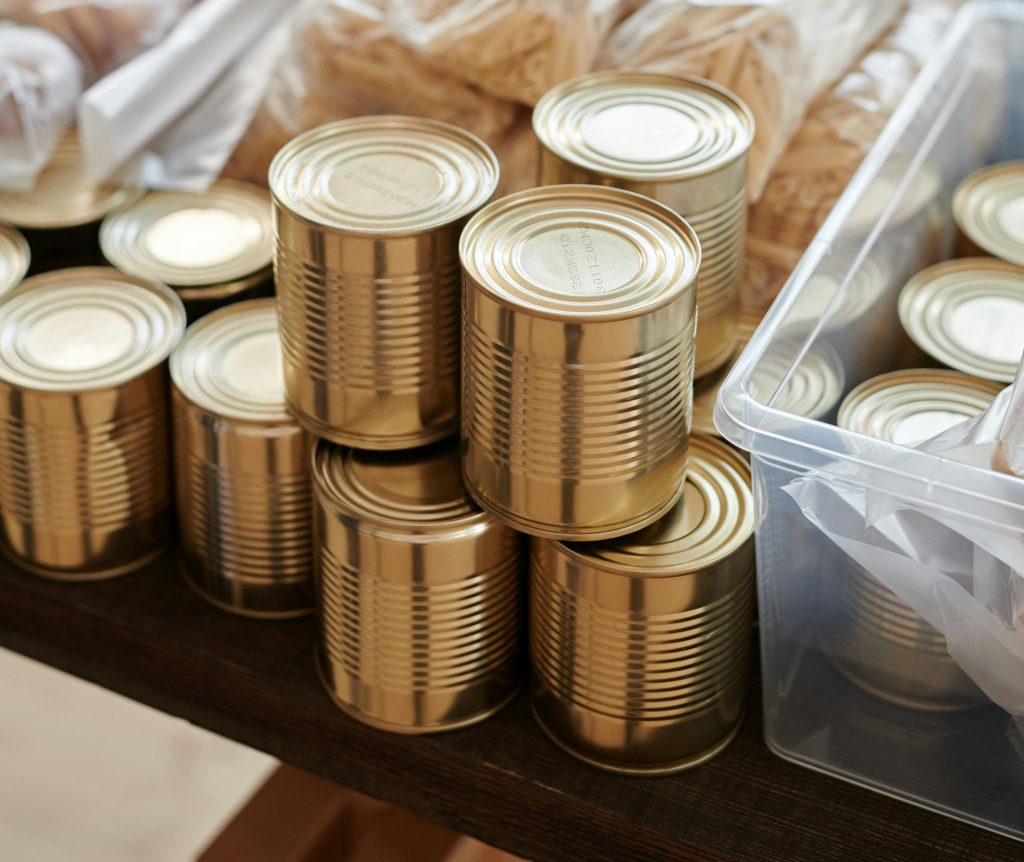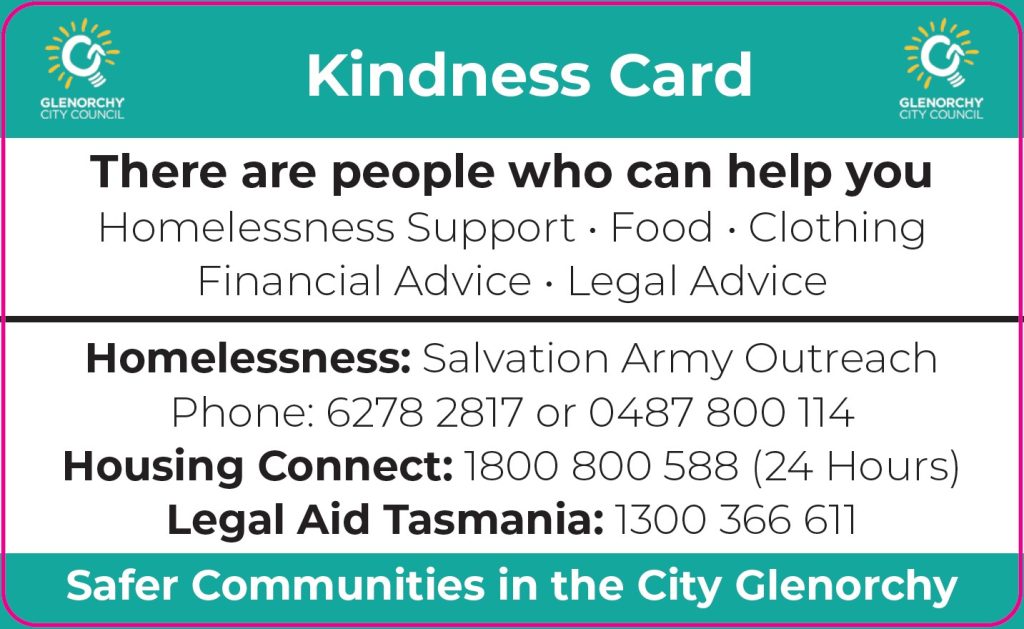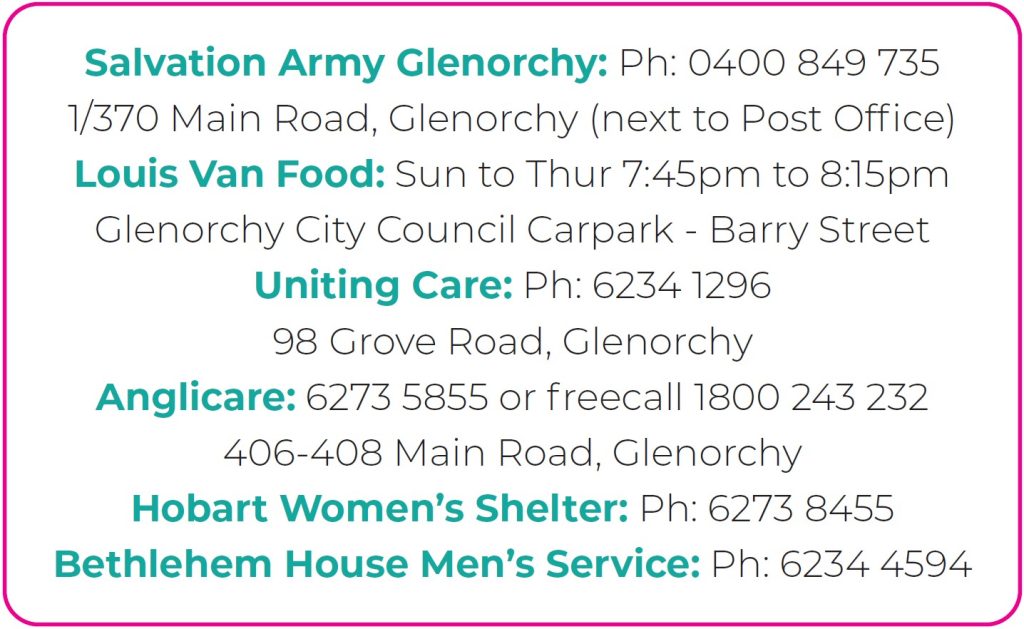Glenorchy City Council sees housing as a basic human right and supports more safe, liveable and affordable housing in our City. With over 4700 applications on the waiting list for public or community housing, it’s clear that many Tasmanians are under pressure. At the last Census, 1550 households in Glenorchy needed affordable housing and 2224 households (10.8%) were experiencing housing stress.
Rough sleeping (also known as street homelessness) is a visible issue across the City of Glenorchy. At the last Census there were 312 people experiencing homelessness in the Glenorchy City area: 6.1% of these were living in tents, improvised dwellings or sleeping out.
People sleeping rough are experiencing the most visible and extreme form of homelessness. Many other people experiencing homelessness in Glenorchy are couch-surfing (21.8%), living in severely overcrowded dwellings (47.4%), crisis shelters (19.2%) or sleeping in temporary lodgings like boarding houses (4.8%). Learn more about housing in the City of Glenorchy here.

People can become homeless for many reasons including loss of income or employment, the lack of affordable housing, family breakdown and domestic violence, illness, transition from care or custody, mental health, gambling, or substance issues. Homelessness and insecure housing is a big concern for young people in Tasmania who face additional barriers to getting a private rental property.
For many, homelessness is a temporary hardship: they can quickly recover and stabilise their situation. For others, finding and maintaining a safe and affordable home is extremely difficult, and homelessness lasts much too long. Homelessness can have lasting impact on a person’s health and wellbeing.
We know people tend to sleep rough in highly populated locations due to greater access to services and the sense of safety that comes with a constant bustle of people. But every day is a constant struggle for people experiencing this extreme form of homelessness: accessing food and safe drinking water, getting to appointments, looking for work and finding meaningful activities to do. According to the Wayside Chapel (NSW), homeless people in Sydney walk an average of 28km every week just to meet their basic needs.
It can be really confronting to see someone on the street or living outside in your neighbourhood and not know how to help. Luckily, there are things you can do, both small and large, to move from feeling hopeless to helpful. Please follow the links to find sources of information and links to more resources.
Acknowledgement
Say hello! It’s as simple looking someone in the eye or smiling to acknowledge someone’s humanity and worth. Acknowledgement can make someone feel seen and a part of the community.

Giving
The best way to support someone in the moment is to ask that person what they need. If you are able, you can give people money or goods directly. If you prefer to provide goods rather than money, ask the person what they need in that moment rather than assuming. If in doubt, money or a gift card provides a person the most options to address their immediate needs.
During homelessness week (5-11 August) 2024, you can donate non-perishable food, pet food, toiletries, clean, (new if possible) warm clothing and warm sleeping supplies at the Glenorchy City Council Chambers, 374 Main Road Glenorchy. These goods will be donated to our nearest service for people sleeping rough, the Salvation Army Doorways Program. Please do not donate any other items to us.
Check out this list from Hobart City Mission if you’re looking for ideas.

Engaging
If you’re feeling chatty and it feels appropriate, you can see if the person would like to chat. Let them lead: depending on the person, the conversation may involve more listening or asking simple questions. Do keep in mind personal space and the person’s willingness to engage, and ensure you respect their boundaries. Do not take photos or recordings of the person and ensure you maintain your own privacy.
Local Services
If you are concerned about whether someone is receiving support, contact and notify your local council. These notifications lead to referrals to services like Salvos Street to Home program who can go out and provide support.
If it seems appropriate, you may want to ask someone directly if they are aware of or connected with support in their area. Glenorchy City Council has “Kindness Cards” available which have a list of services and phone numbers for the Glenorchy area. Kindness cards are available at Chambers or contact 03 6216 6800. These cards are a great way to spread the word about local services.


Learn more about homelessness and housing support in Glenorchy
Visit Glenorchy City Council’s Community Profile – free access to information and statistics about our community, based on data from the Australian Bureau of Statistics.
Read Glenorchy City Council’s Statement of Commitment on Housing
- Shelter Tas
- Homelessness Australia
- Learn why rough sleeping is just the tip of the iceberg.
- Colony47 – support for young people
- Anglicare Tasmania Housing Connect – helping low income Tasmanians to find and maintain affordable homes.
- Hobart City Mission
- Hobart Women’s Shelter – buy a brick campaign
- Bethlehem House Men’s Service – 24 hour service centre
- Tenant’s Union of Tasmania: Don’t Panic – a tenants’ guide to renting in Tasmania
